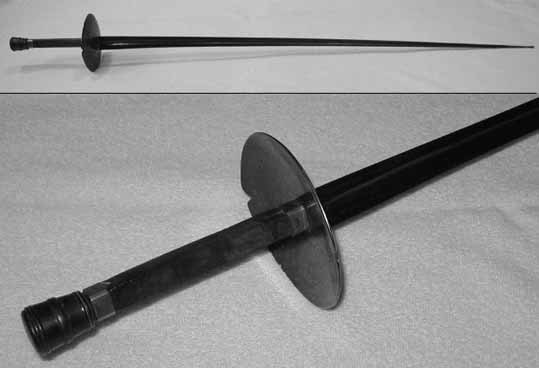Home
/
M0126
Swords: M0126
Title
Henry Irving's stage sword
Technique
Mixed media
Subject
Character
Fabian/Louis dei Franchi : The Corsican Brothers
Dimensions
Height: 104.5cm
Width: 12.2cm
Depth: 10.2cm
Width: 12.2cm
Depth: 10.2cm
Other materials
Steel sword with wooden hilt and two brass bands
Inscription/signature
"'THE CORSICAN BROTHER.' / TO WALTER POLLOCK / from Henry Irving / WITH LOVE & FRIENDING." (engr. On sides of blade) "No.4" (on brass band)
Provenance
Presented to the Garrick Club by Mr Guy Pollock, 1937
Other number
Gift 553 [with M0125]
Henry Irving revived Dion Boucicault's romantic drama, "The Corsican Brothers", at the Lyceum Theatre, opening on 18th September 1880. He himself played the role of the two twin brothers Fabian and Louis dei Franchi. At the end of Act I Louis is killed in a sword duel, an event witnessed as a vision by Fabian. According to Bram Stoker, the plot also demanded that Louis has a vision of Fabian at the same time, meaning that Irving required two doubles on the stage at the same time. Fabian, in his attempt to avenge his twin's death, is eventually also killed in a sword duel in the final scene.
Both duels took place in a "glade in the Forest of Fontainebleau". The scenery was both fantastic and ingenious, causing awe in the audience. In what was considered an impossibly short amount of time the whole stage had been turned into a snow covered forest. The snow appears to be real; the actor's kicking it up as they walk. Again Bram Stoker provides the answer:
"It was salt, common coarse salt which was white in the appointed light and glistened like real snow. There were tons of it. A crowd of men stood ready in the wings with little baggage-trucks such as are now used in the corridors of great hotels; silent with rubber wheels. On them were great wide-mouthed sacks full of salt. When the signal came they rushed in on all sides each to his appointed spot and tumbled out his load, spreading it evenly with great wide-bladed wooden shovels."
[Bram Stoker, "Personal Reminiscences of Henry Irving" London, 1906 Vol.1 p161]
The donor was presumably a relative of Walter Herries Pollock, the original recipient of the sword. A journalist and writer, he was a very close friend of Henry Irving, and his father, Sir Frederick Pollock gave the young Henry Irving much encouragement in his early days on the stage.
Both duels took place in a "glade in the Forest of Fontainebleau". The scenery was both fantastic and ingenious, causing awe in the audience. In what was considered an impossibly short amount of time the whole stage had been turned into a snow covered forest. The snow appears to be real; the actor's kicking it up as they walk. Again Bram Stoker provides the answer:
"It was salt, common coarse salt which was white in the appointed light and glistened like real snow. There were tons of it. A crowd of men stood ready in the wings with little baggage-trucks such as are now used in the corridors of great hotels; silent with rubber wheels. On them were great wide-mouthed sacks full of salt. When the signal came they rushed in on all sides each to his appointed spot and tumbled out his load, spreading it evenly with great wide-bladed wooden shovels."
[Bram Stoker, "Personal Reminiscences of Henry Irving" London, 1906 Vol.1 p161]
The donor was presumably a relative of Walter Herries Pollock, the original recipient of the sword. A journalist and writer, he was a very close friend of Henry Irving, and his father, Sir Frederick Pollock gave the young Henry Irving much encouragement in his early days on the stage.

